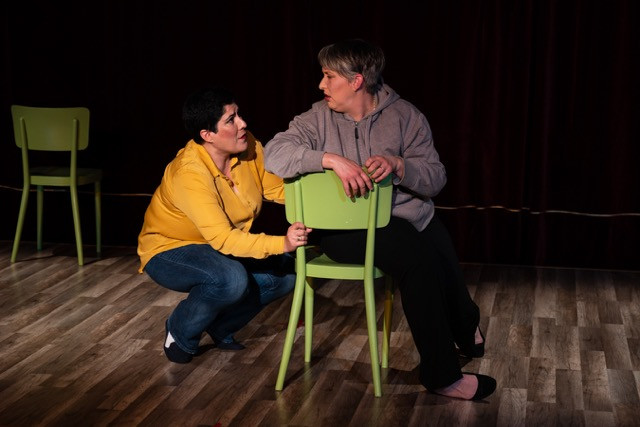The play grabs the audience’s attention from the start, engages them throughout its 45-minutes, has an easy-to-strike set, smart and witty dialogue, and two lead actresses with obvious rapport.
Christine Probst and Rachael Singh play sisters Eva and Nicola, whose relationship is put under strain by a tragedy and then further jeopardised by a transformative meeting. The result is another calamity from which neither may recover.
It is this which opens the play as we see Eva standing over the lifeless body of Timothy (Victor Bonanno) with a gun in her hand. When Nicola arrives at the scene--Victor’s apartment--Eva is disturbingly cool and collected and ready to submit herself to the police despite her sister’s pleas for her to run away. Nicola, as a narrator whose reliability we only rarely question, then takes the audience on a journey back through time to the tragic event that eventually leads to Timothy’s murder and Eva’s catharsis.
And therein lies the play’s only fault. While explaining action and motivation directly to the audience, Scott’s text veers dangerously towards condescension. Even after the sisters have discussed Eva’s belief in the ripple effect, Scott feels the need to explain it again via Nicola’s narration, much of which could have been cut from the play without any loss in understanding.
But the premise--are actions that may seem negligible at the time responsible for later events that can change a life?--is a fascinating one that has troubled many writers and philosophers over the years. A series of seemingly innocuous events--a decision to walk instead of taking a taxi, an unexpected phone call, the wearing of a precious necklace--may all have been ripples that build towards the tsunami that ruins Eva’s life. The reverse narrative also allows the audience to spot clues and enjoy references that connect the characters.
Familiar to Luxembourg theatre audiences, Probst is as charismatic as ever on stage and beautifully conveys the gamut of emotions that run through her character throughout the play. Newcomer Singh more than holds her own and delivers a performance of supreme natural ease that gladly allows Probst to take centre stage. Bonanno is convincing as the complex and tragic Timothy, a man whose desperation and unconscious denial of his past is on two occasions the catalyst for Eva’s dreadful transformation. Kim Hermans does a solid job in a couple of minor roles.
Directors Chris Wilson and Valerie Scott have chosen to stage the play with minimal fuss--two simple chairs represent the various sets and the wings are left open, so we can observe the actors off stage as they prepare for the next scene. They move the action on swiftly to its terrible conclusion as two characters set off on a “night to remember”.
“The Ripple Effect” is one of 12 one-act plays competing at the Festival of European Anglophone Theatrical Societies, which takes place in Ottobrunn, near Munich, from 30 May to 2 June. For details visit the FEATS website.
